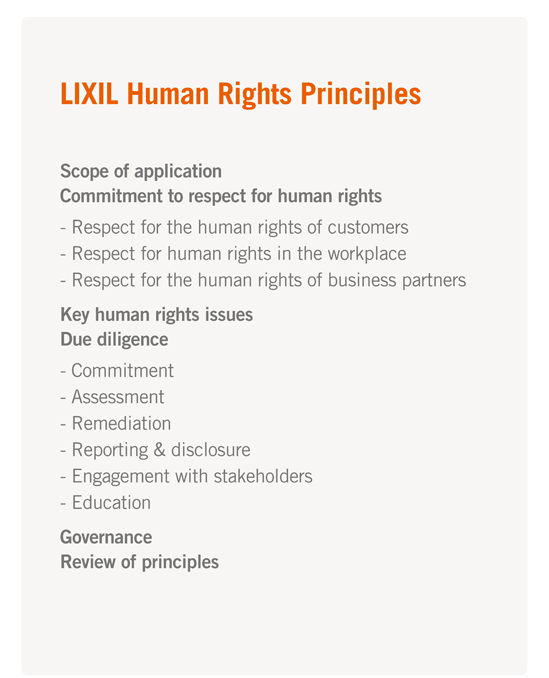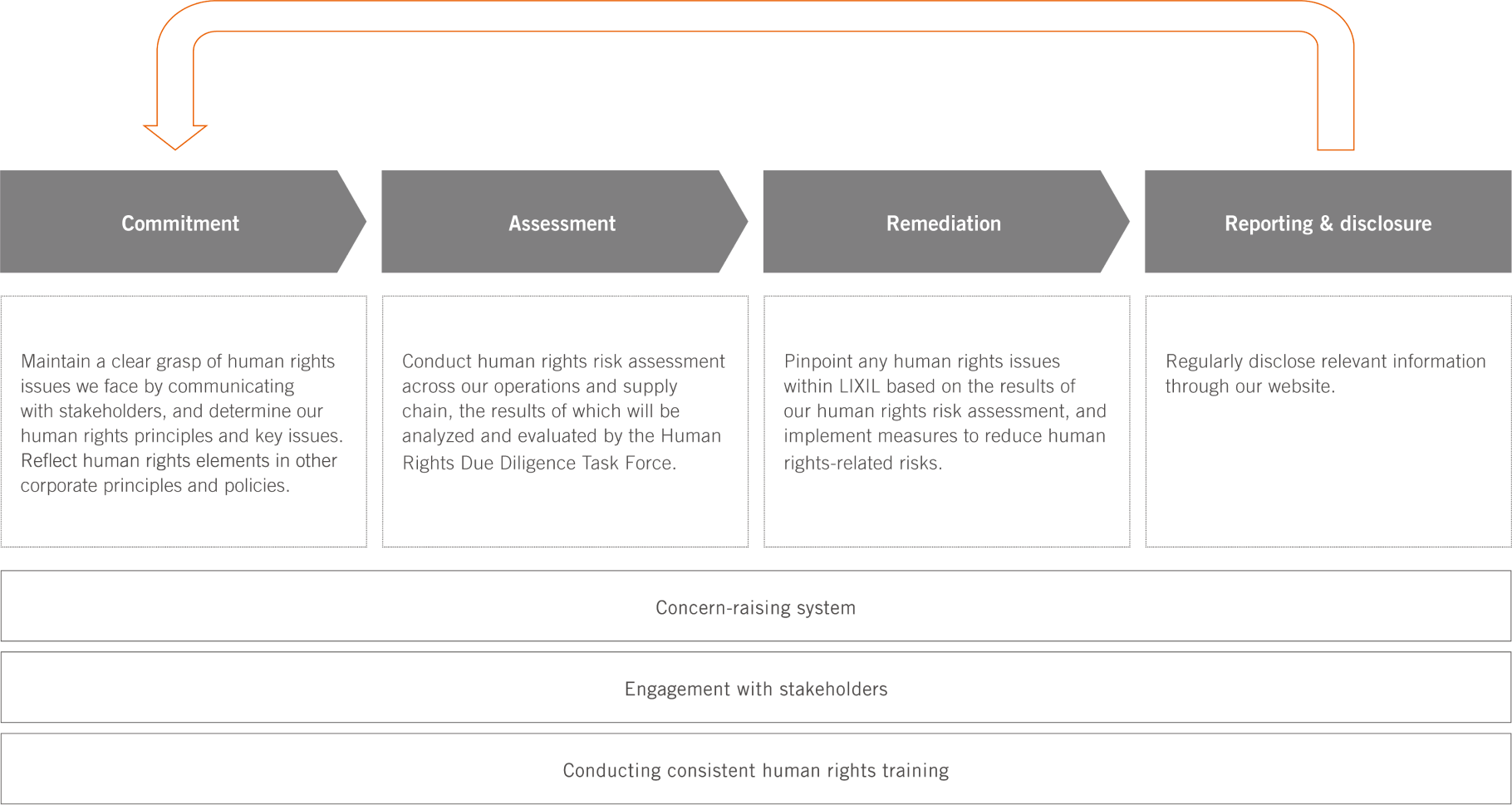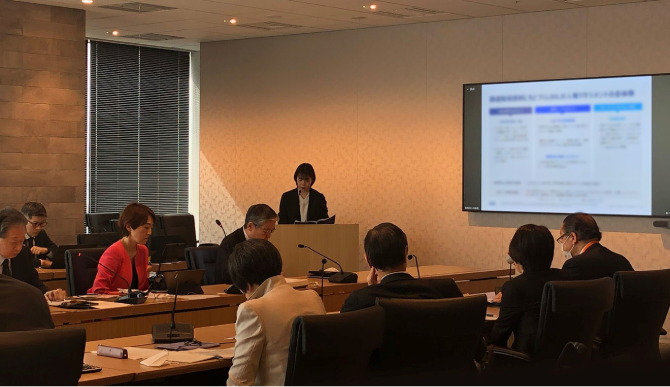LIXIL makes pioneering water and housing products that solve everyday, real-life challenges, making better homes a reality for everyone, everywhere.
- Global Site
-
- English
- Japanese
- Brand Sites
Global
- Global Site
-
- English
- Japanese
- Brand Sites

Our Approach & Commitment
Based on the LIXIL Human Rights Principles, we strive to uphold the human rights of all stakeholders, including customers, business partners including suppliers, residents living near our factories and offices, and our employees.
Human Rights Principles
LIXIL’s business activities are built on a fundamental respect for human rights. The LIXIL Human Rights Principles are founded in accordance with international standards, including the International Bill of Human Rights, the International Labour Organization (ILO) Declaration on Fundamental Principles and Rights at Work, and the United Nations (UN) Guiding Principles on Business and Human Rights. We also promote efforts to respect for the rights of all humans, including those of children based on the approach of the Children’s Rights and Business Principles developed by UNICEF. If there are any discrepancies between the internationally recognized standards and local laws and regulations, we adhere to the higher commitment. If any contradictions exist, we seek a way of respecting international standards while complying with local laws and regulations.

Our Human Rights Principles stipulate key human rights issues, including to prohibit discrimination, prohibit forced and child labor, respect freedom of association and collective bargaining, and ensure decent wages and working hours, all in alignment with international standards. The principles also clearly state that we comply with laws and regulations regarding human trafficking, equal pay for equal work, immigrant labor, etc. In addition, the principles state that we also expect our business partners including suppliers to support the content of the principles and to adopt similar principles.
LIXIL Human Rights Principles (A new page will open) PDF: 177KB >
LIXIL periodically reviews and evolves the principles to continue to become a better protector of human rights. In FYE2022, we reviewed the principles we had formulated in FYE2016 and subsequently submitted revised principles that were approved by the Board of Executive Officers and signed by the CEO. Particularly, we specified in more detail our governance structure led by the executive officer overseeing legal and compliance, our key human rights issues determined in FYE2021, and our human rights due diligence process as well as our concern-raising system and overall commitment to reducing human rights risks based on those frameworks.
In May 2022, we strengthened our global, company-wide commitment by making our principles available in 17 languages.
Other Principles
LIXIL bases the formation of our corporate principles upon a fundamental commitment to uphold human rights.
LIXIL’s Various Policies, etc. >
In our relationships with suppliers and other business partners, LIXIL expects them to comply with applicable laws, respect human rights, and engage in ethical conduct based on our Supplier Code of Conduct.
Supplier Code of Conduct (A new page will open) PDF: 119KB >
LIXIL’s Key Human Rights Issues
In addition to formulating our Human Rights Principles, LIXIL has identified key human rights issues as focus areas for mitigating potential human rights risks as below. By addressing these issues, we aim to strengthen our human rights due diligence. We regularly conduct human rights risk assessment and will review these issues based on the assessment result.
- Provide equal opportunity and prohibit discrimination
- Prohibit forced and child labor
- Respect freedom of association and collective bargaining
- Ensure decent wages and working hours
- Ensure occupational health and safety
- Prohibit harassment
- Legal, fair, and transparent acquisition and use of personal data
Key Activities Designed to Strengthen Our Commitment
| FYE2016 | Formulated the LIXIL Human Rights Principles |
| FYE2018 | Established Human Rights Due Diligence Task Force |
| FYE2021 | Identified our seven key human rights issues |
| FYE2022 |
|
Our System
LIXIL established the Human Rights Due Diligence Task Force in FYE2018, comprising members from a broad range of departments including the former Corporate Responsibility Office (currently Impact Strategy Office), Human Resources Department, and former Compliance Department (currently Compliance & Ethics Department), with the aim of strengthening and ensuring strict adherence to our human rights due diligence process as a company that operates globally. In line with our Human Rights Principles revised in FYE2022, we set up a new governance structure led by the executive officer in charge of legal and compliance who also oversees human rights issues. We are using these systems to strengthen our company-wide human rights due diligence and promote transparent reporting. We are also in the process of reviewing our governance structure, including the Human Rights Due Diligence Task Force, to further strengthen our business and human rights efforts globally.
Human rights management structure

Our Human Rights Due Diligence Process
We seek to mitigate human rights risks by analyzing and assessing potential risks using the following human rights due diligence process.
Human rights due diligence process

Assessment: Identifying Human Rights Risks
We strive to identify potential human rights risks through various activities, centered primarily around the survey by our Human Rights Due Diligence Task Force.
| Key activities (department in charge) |
Overview | Major target stakeholders |
|---|---|---|
| Human rights survey of employees (Human Rights Due Diligence Task Force) |
Conducted a human rights survey of all global employees, including indirect employees in FYE2022. We are taking remediation actions to mitigate any potential risks identified by the survey. |
All global employees, including indirect employees |
| Occupational safety audit (Safety and Quality Management Division) |
We conduct an annual occupational safety audit of Japanese bases through questionnaires and onsite visits, and take necessary measures based on the audit results at each base. |
All employees of Japanese bases |
| LIXIL Voice employee opinion surveys (Human resources department) |
We conduct the LIXIL Voice annual employee opinion survey of all global employees. We established KPIs to measure engagement, inclusion, wellbeing and intent to stay, and are seeking to identify any issues, formulate prompt improvement measures, and reflect the findings into our global strategies and initiatives. |
All global employees |
| Responsible procurement surveys (Indirect Procurement · Procurement Management Department) |
We conduct responsible procurement surveys to identify risks in the supply chain and to address issues in partnership with suppliers. We provide site visits and other forms of individual guidance to high-risk suppliers. Conducting and Following Up on Responsible Procurement Survey > |
Suppliers |
Remediation: Measures to Mitigate Human Rights Risks
LIXIL takes measures to mitigate and address risks and issues that have been identified through our human rights survey of our employees.
Human Rights Risk Assessments and Risk Mitigation Plans & Their Progress
| Target stakeholders | All global employees (including indirect employees) |
| Name | Human rights survey of all global employees |
| Process |
|
| Outline |
|
| Summary of survey results | The percentage of positive responses*1 in the survey was very high at 85% on average. However, we have formulated risk mitigation plans for areas with potential human rights risks where we received negative responses,*2 and are implementing remedies. |
| Details of the plans and progress |
We have formulated plans to mitigate potential human rights risks identified in the survey and are implementing the following remedies. In FYE2023, we focused particularly on strengthening education and training within the company (remediation plan 1 below). 1. Conduct and strengthen training, workshops, etc. to improve understanding of human rights
2. Strengthen communication and initiatives relating to career development
Details: Diversity & Equal Opportunity > 3. Strengthen measures to optimize working hours and prevent overwork, encourage employees to take paid leave
|
| Future plans | In FYE2023, we incorporated assessment indicators to measure risks relating to the LIXIL’s key human rights issues into the LIXIL Voice employee opinion survey (conducted once per year) as a trial. As a next step, we will use key learnings from this experiment to improve the assessment method used in human rights risk surveys of our employees. |
*1 When respondents selected “Agree” or “Slightly agree.”
*2 When respondents selected “Slightly disagree” or “Disagree.”
Concern-Raising System
LIXIL has established a concern-raising system that is operated in accordance with our policies on confidentiality, prohibition of retaliation and procedures for reporting concerns. It is designed to gather details of compliance violations and to ensure early action on any wrongdoings and violations, and enable preventative measures. We can mitigate or remediate risks by accepting reports from inside and outside the company through this system.
-
Concern-raising system that is available to all group employees, including those at subsidiaries outside Japan
We receive concerns through LIXIL Compliance Hotline – Speak Up!, which is available online in 18 languages. In Japan, we also provide a reporting channel with external lawyers serving as contacts. We accept anonymous reporting through either channel. -
Receiving reports from external stakeholders such as business partners including suppliers
We receive reports from around the world via the LIXIL Compliance Hotline – Speak Up! In addition, in Japan, we have established a contact point via an external law firm. We accept anonymous reporting through either channel.
Education and Workplaces That Promote Respect for Human Rights
1. Education
LIXIL conveys information and conducts awareness-building programs internally to ensure human rights are upheld. In FYE2023, we conducted education for all employees, as well as business and human rights training with an external expert for directors and executive officers. On internal social media, about once per month we shared information and knowledge about human rights, and published a video montage with messages on human rights from the CEO and other global leaders during Compliance Week.
- Training and awareness building on compliance, D&I, and information security for all employees
- Business and human rights training for directors and executive officers, from which videos and materials (in Japanese and English) were made available to all employees via internal social media
- Human rights training for members from the Human Rights Due Diligence Task Force who are responsible for promoting business and human rights in LIXIL
- Convey human rights-related information on internal social media that all employees can access

Business and human rights training for directors and executive officers (In March 2023)
- Attendance rate of training for directors and executive officers
- 100%
2. Creating workplaces that uphold diversity
We are dedicated to creating a culture of inclusivity, and developing and acquiring talent based on our D&I Strategy. So that diverse talent can demonstrate their full abilities and be active at work, we are expanding support for workstyles that can be tailored to accommodate different life-stage responsibilities, such as childcare and nursing care, and are creating workplaces where everyone can work comfortably regardless of characteristics such as sexual orientation, gender identity, or disability.
Diversity & Inclusion >
Diversity & Equal Opportunity >
3. Promoting employee safety & health
We are establishing an occupational health and safety management system and promoting health-oriented management in order to protect the health and safety of all our employees.
